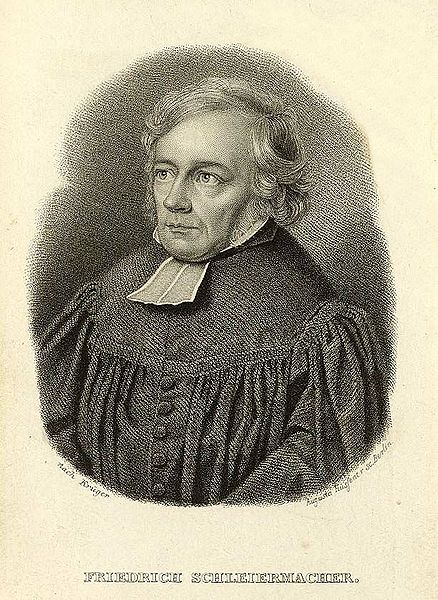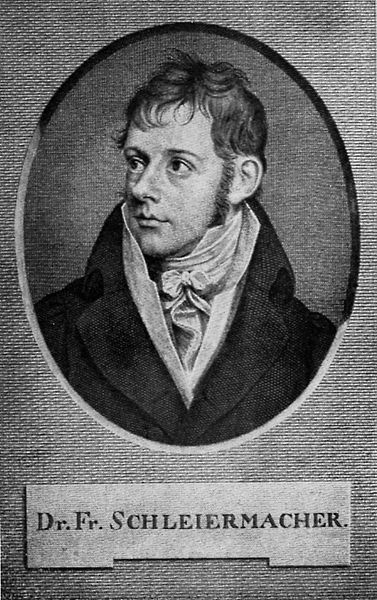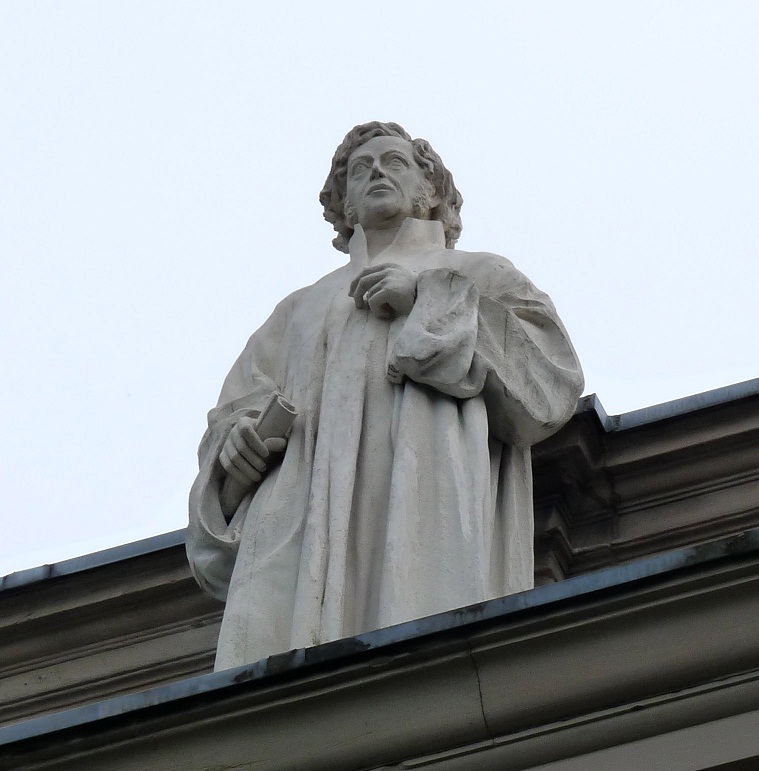<Back to Index>
- Philosopher Friedrich Daniel Ernst Schleiermacher, 1768
- Painter René François Ghislain Magritte, 1898
- General of the Qing Dynasty Zeng Guofan, 1811
PAGE SPONSOR



Friedrich Daniel Ernst Schleiermacher (November 21, 1768 – February 12, 1834) was a German theologian and philosopher known for his impressive attempt to reconcile the criticisms of the Enlightenment with traditional Protestant orthodoxy. He also became influential in the evolution of Higher Criticism. His work also forms part of the foundation of the modern field of hermeneutics. Because of his profound impact on subsequent Christian thought, he is often called the "Father of Modern Protestant Theology." The Neo-Orthodoxy movement of the twentieth century, represented most prominently by Karl Barth, was in many ways an attempt to overturn his influence.
Schleiermacher was born in Breslau in the Prussian Province of Silesia, the son of a Prussian army chaplain in the Reformed Church. He was educated in a Moravian school at Niesky in Upper Lusatia, and at Barby near Halle. However, pietistic Moravian theology failed to satisfy his increasing doubts, and his father reluctantly gave him permission to enter the University of Halle, which had already abandoned pietism and adopted the rationalist spirit of Friedrich August Wolf and Johann Salomo Semler. As a theology student Schleiermacher pursued an independent course of reading and neglected the study of the Old Testament and Oriental languages. However, he did attend the lectures of Semler, where he became acquainted with the techniques of historical criticism of the New Testament, and of Johann Augustus Eberhard, from whom he acquired a love of the philosophy of Plato and Aristotle. At the same time he studied the writings of Immanuel Kant and Friedrich Heinrich Jacobi, and began to apply ideas from the Greek philosophers to a reconstruction of Kant's system. Schleiermacher developed a deep rooted skepticism as a student, and soon he rejected orthodox Christianity.
Brian
Gerrish, a scholar of the works of Schleiermacher writes: "In a letter
to his father, Schleiermacher drops the mild hint that his teachers
fail to deal with those widespread doubts that trouble so many young
people of the present day. His father misses the hint. He has himself
read some of the skeptical literature, he says, and can assure
Schleiermacher that it is not worth wasting time on. For six whole
months there is no further word from his son. Then comes the bombshell.
In a moving letter of 21 January 1787, Schleiermacher admits that the
doubts alluded to are his own. His father has said that faith is the
"regalia of the Godhead," that is, God’s royal due." Schleiermacher
confessed: "Faith is the regalia of the Godhead, you say. Alas! dearest
father, if you believe that without this faith no one can attain to
salvation in the next world, nor to tranquility in this — and such, I
know, is your belief — oh! then pray to God to grant it to me, for to
me it is now lost. I cannot believe that he who called himself the Son
of Man was the true, eternal God; I cannot believe that his death was a
vicarious atonement." At the completion of his course at Halle, Schleiermacher became the private tutor to the family of Count Dohna - Schlobitten,
developing in a cultivated and aristocratic household his deep love of
family and social life. Two years later, in 1796, he became chaplain to
the Charité Hospital
in Berlin. Lacking scope for the development of his preaching skills,
he sought mental and spiritual satisfaction in the city's cultivated
society and in intensive philosophical studies, beginning to construct
the framework of his philosophical and religious system. Here
Schleiermacher became acquainted with art, literature, science and
general culture. He was strongly influenced by German Romanticism, as represented by his friend Karl Wilhelm Friedrich von Schlegel. This interest is borne out by his Confidential Letters on Schlegel's Lucinde, as well as his relationship with Eleonore Grunow, wife of a Berlin clergyman. Though
his ultimate principles remained unchanged, Romanticism led
Schleiermacher to place more emphasis on human emotion and the
imagination. Meanwhile he studied Spinoza and Plato,
both of whom were important influences. He became more indebted to
Kant, though they differed on fundamental points. He sympathised with
some of Jacobi's positions, and took some ideas from Fichte and Schelling. The literary product of this period of rapid development was his influential book, Reden über die Religion (On Religion: Speeches to Its Cultured Despisers) (1799, ed. Göttingen, 1906; Eng. trans., 1893) and his "new year's gift" to the new century, the Monologen (Soliloquies) (1800; ed. 1902). In
the first book Schleiermacher gave religion an unchanging place among
the divine mysteries of human nature, distinguished it from what he
regarded as current caricatures of religion, and described the
perennial forms of its manifestation. This established the programme of
his subsequent theological system. In the Monologen he
revealed his ethical manifesto, in which he proclaimed his ideas on the
freedom and independence of the spirit, and on the relationship of the
mind to the sensual world, and sketched his ideal of the future of the
individual and of society.
From 1802 to 1804, Schleiermacher served as a pastor in the Pomeranian town of Stolp.
He relieved Friedrich Schlegel entirely of his nominal responsibility
for the translation of Plato, which they had together undertaken (vols.
1-5, 1804 – 1810; vol. 6, Repub. 1828). Another work, Grundlinien einer Kritik der bisherigen Sittenlehre [Outlines
of a Critique of the Doctrines of Morality to date] (1803), the first
of his strictly critical and philosophical productions, occupied him;
it is a criticism of all previous moral systems, including those of
Kant and Fichte — Plato's and Spinoza's find most favour. It contends
that the tests of the soundness of a moral system are the completeness
of its view of the laws and ends of human life as a whole and the
harmonious arrangement of its subject matter under one fundamental
principle. Although it is almost exclusively critical and negative, the
book announces Schleiermacher's later view of moral science, attaching
prime importance to a Güterlehre,
or doctrine of the ends to be obtained by moral action. The obscurity
of the book's style and its negative tone prevented immediate success. In 1804, Schleiermacher moved as university preacher and professor of theology to the University of Halle,
where he remained until 1807, quickly obtaining a reputation as
professor and preacher; he exercised a powerful influence in spite of
contradictory charges which accused him of atheism, Spinozism and
pietism. In this period he wrote his dialogue the Weihnachtsfeier (Christmas Eve: Dialogue on the Incarnation) (1806), which represents a midway point between his Speeches and his great dogmatic work, Der christliche Glaube (The Christian Faith);
the speakers represent phases of his growing appreciation of
Christianity as well as the conflicting elements of the theology of the
period. After the Battle of Jena he
returned to Berlin (1807), was soon appointed pastor of the Trinity
Church, and the next year married Henriette von Willich, the widow of
his friend. At the foundation of the University of Berlin (1810), in which he took a prominent part, Schleiermacher obtained a theological chair, and soon became secretary to the Prussian Academy of Sciences.
He took a prominent part in the reorganization of the Prussian church, and became the most powerful advocate of the union of the Lutheran and Reformed divisions of German Protestantism, paving the way for the Prussian Union of
Churches (1817). The twenty four years of his professional career in
Berlin began with his short outline of theological study (Kurze Darstellung des theologischen Studiums, 1811), in which he sought to do for theology what he had done for religion in his Speeches. While
he preached every Sunday, Schleiermacher also gradually took up in his
lectures in the university almost every branch of theology and
philosophy — New Testament exegesis, introduction to and interpretation of the New Testament, ethics (both philosophic and Christian), dogmatic and practical theology, church history, history of philosophy, psychology, dialectics (logic and metaphysics), politics, pedagogy, translation and aesthetics. In politics Schleiermacher supported liberty and progress, and in the period of reaction which followed the overthrow of Napoleon he was charged by the Prussian government with "demagogic agitation" in conjunction with the patriot Ernst Moritz Arndt. At the same time Schleiermacher prepared his chief theological work Der christliche Glaube nach den Grundsätzen der evangelischen Kirche (1821 – 1822;
2nd ed., greatly altered, 1830 – 1831; 6th ed., 1884). The fundamental
principle is that religious feeling, the sense of absolute dependence
on God as communicated by Jesus through
the church, and not the creeds or the letter of Scripture or the
rationalistic understanding, is the source and basis of dogmatic
theology. The work is therefore simply a description of the facts of
religious feeling, or of the inner life of the soul in its relations to
God, and these inward facts are looked at in the various stages of
their development and presented in their systematic connection. The aim
of the work was to reform Protestant theology, to put an end to the
unreason and superficiality of both supernaturalism and rationalism,
and to deliver religion and theology from dependence on perpetually changing systems of philosophy. Though
the work added to the reputation of its author, it aroused the
increased opposition of the theological schools it was intended to
overthrow, and at the same time Schleiermacher's defence of the right
of the church to frame its own liturgy in opposition to the arbitrary
dictation of the monarch or his ministers brought him fresh troubles.
He felt isolated, although his church and his lecture room continued to
be crowded. Schleiermacher continued with his translation of Plato and prepared a new and greatly altered edition of his Christlicher Glaube, anticipating the latter in two letters to his friend Lucke (in the Studien und Kritiken,
1829), in which he defended his theological position generally and his
book in particular against opponents on the right and the left. The
same year Schleiermacher lost his only son — a blow which, he said,
"drove the nails into his own coffin." But he continued to defend his
theological position against Hengstenberg's party on the one hand and
the rationalists von Cölln and D. Schulz on the other, protesting
against both subscription to the ancient creeds and the imposition of a
new rationalistic formulary.
Schleiermacher died of an inflammation of the lungs on February 12, 1834.